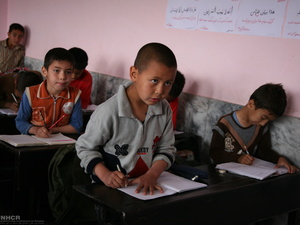Rwandan gets on his bike in Johannesburg to raise funds for education
Rwandan gets on his bike in Johannesburg to raise funds for education

Pie-Pacifique Kabalira-Uwase crosses the Nelson Mandela bridge in Johannesburg during the Momentum 94.7 Cycle Challenge.
JOHANNESBURG, South Africa, November 22 (UNHCR) - Pie-Pacifique Kabalira-Uwase knew the road race would be a tough mental and physical challenge, but he had faced far worse in his native Rwanda and as a refugee.
In the end, he comfortably completed last Sunday's Momentum 94.7 Cycle Challenge under cloudy skies in Johannesburg, alongside thousands of professional and amateur riders.
And, more importantly, he raised vital funds for a scholarship programme to put refugees and asylum-seekers through the University of KwaZulu-Natal (UKZN). "Education is one of the ways we can help empower refugees to be self-reliant, [and] make a difference in their host countries," he said after taking part in the 94.7-km event, the world's second-largest timed bicycle race.
The 30-year-old, who was granted asylum in South Africa a decade ago and now works as an account executive at a leading training and enterprise development company, knows from experience how important higher education is. "Against all odds, I was able to graduate from university while struggling as a refugee . . . UKZN was the first university in South Africa to change their policy to allow recognized refugees to receive financial aid," he told UNHCR.
Kabalira-Uwase first came to South Africa in 2001, fleeing persecution in Rwanda, which is still trying to come to terms with its dark past. "During the genocide [of 1994], we had several attempts on our lives by the interhamwe [a largely ethnic Hutu militia] because we were thought to be moderate Hutus, and later on we were accused of being sympathetic to the interhamwe."
At his mother's urging, he set out on a long journey by boat, vehicle and foot that took him through Tanzania and Mozambique to South Africa. "My main goal was to get somewhere where I would be safe, but also could go to university," he recalled, adding that he had planned to head across the Indian Ocean to Madagascar, "because it was a French-speaking country and my first language was French."
But he changed his mind after a chance meeting in an internet café in Mozambique with a Congolese man who suggested that Kabalira-Uwase go to South Africa, where asylum-seekers and refugees have the right to work and study. He reached Durban and was granted asylum in November 2001.
Once in South Africa, he knew he had to learn English to make his dream of a university education come true. He found non-skilled labour and spent his free time reading books and watching television to perfect his English.
In November 2001, Kabalira-Uwase successfully applied to study physics at UKZN but was denied a grant because he was not a South African citizen. Luckily, the policy on financial support was amended and he was able to take up his place with a bursary to cover his tuition, accommodation, meals, book allowance, general allowance and travel expenses.
Armed with a Bachelor's degree, he easily found a good job as a business systems and data analysis for a major bank. Ever since, and fired by meetings with other refugees, he has been looking for a way to help others get the kind of education that helped him to become a successful professional.
"I thought I have to do something," said Kabalira-Uwase, who decided to approach UNHCR, which runs a higher education scholarship programme to promote self-sufficiency among refugees and boost their chances of finding a solution to their situation. But there is fierce annual competition for a limited number of places on the German-funded Albert Einstein German Academic Refugee Initiative, or DAFI.
"We currently support 43 refugees with university scholarships in South Africa. This year, we had some 600 applications, but funds available to support only 25 new students," explained UNHCR Senior Programme Officer Kate Makanga.
So Kabalira-Uwase approached the University of KwaZulu-Natal Foundation and convinced them of the need to establish a scholarship fund for refugees and asylum-seekers. "We know that among asylum-seekers and refugees there are many talented but needy students and through this fund, we could also help them," said the UKZN Foundation's executive director, Bruno Van Dyk.
The challenge was to raise money for the fund. That's where the "Road to Education for Refugees and Asylum Seekers" project came from. And Kabalira-Uwase managed to persuade others to join him in the race, like Chantelle Mann from Australia.
"I cannot imagine being denied this privilege [of education]. When I went to school, all the facilities were available to me - financial aid and scholarships. Hearing Pie's story made it really easy to want to support this cause and help others like him," she said. And UNHCR is also fully behind the project, which seems set to become an annual event in the annual event. "This is only the beginning, Kabalira-Uwase said, adding: "The Road to Education for Refugees and Asylum-Seekers will continue!"
By Tina Ghelli in Johannesburg, South Africa
To find out more about the project, go to http://t.co/VmGEi5hV












